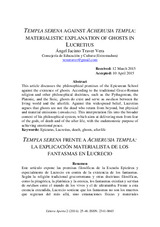Templa Serena frente a Acherusia Templa: la expicación materialista de los fantasmas en Lucrecio
Templa Serena against Achesuria Templa: materialistic explanation of ghosts in Lucretius
Autor
Traver Vera, Ángel Jacinto
Editor
Cultural Association Littera ApertaFecha
2014Materia
EpicuroEpicurus
Lucrecio
Lucretius
Muerte
Death
Fantasmas
Ghosts
Más Allá
Afterlife
METS:
Mostrar el registro METSPREMIS:
Mostrar el registro PREMISMetadatos
Mostrar el registro completo del ítemResumen
Este artículo expone las premisas filosóficas de la Escuela Epicúrea y especialmente de Lucrecio en contra de la existencia de los fantasmas. Según la religión tradicional grecorromana y otras doctrinas filosóficas, como la pitagórica, la platónica y la estoica, los fantasmas existían y servían de médium entre el mundo de los vivos y el de ultratumba. Frente a esta creencia extendida, Lucrecio sostiene que los fantasmas no son los muertos que regresan del más allá, sino emanaciones físicas y materiales (simulacra). Esta interpretación se inscribe en el contexto más general de su sistema filosófico, cuyo objeto es librar a los hombres del miedo a los dioses, a la muerte y al más allá, con la finalidad eudemonista de alcanzar el sosiego emocional. This article discusses the philosophical premises of the Epicurean School against the existence of ghosts. According to the traditional Greco-Roman religion and other philosophical doctrines, such as the Pythagorean, the Platonic, and the Stoic, ghosts do exist and serve as medium between the living world and the afterlife. Against this widespread belief, Lucretius argues that ghosts are not the dead who return from beyond, but physical and material emissions (simulacra). This interpretation fits into the broader context of his philosophical system, which aims at delivering men from fear of the gods, of death and of the after-life, with the eudemonistic purpose of achieving emotional peace

